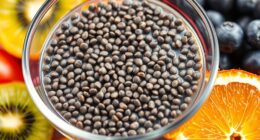We have important information to share about chia seeds.
Did you know that despite being a popular health food, they can pose certain risks and allergies?
In this article, we’ll provide you with 7 essential tips to keep in mind.
From potential digestive issues to allergic reactions and interactions with medications, we’ve got you covered.

Stay tuned to learn more about these health risks and how to navigate them for your well-being.
Key Takeaways
- Potential digestive issues include bloating, gas, diarrhea, and the need to start with small amounts and gradually increase intake.
- Allergic reactions to chia seeds can manifest as hives, itching, swelling, and other symptoms. Seek medical attention for proper diagnosis and treatment.
- Chia seeds may interact with certain medications, such as anticoagulants, blood pressure medications, diabetes medications, and thyroid medications. Consult a healthcare provider before making any changes to medication regimen.
- Chia seeds can pose a choking hazard, so it is important to consume them in hydrated form and take preventive measures such as cutting food into small pieces, supervising meal times, and encouraging slow eating.
Potential Digestive Issues
We will explore three potential digestive issues that may arise from consuming chia seeds.
These issues include bloating, gas, and diarrhea. While chia seeds are generally safe to consume, they can cause gastrointestinal discomfort in some individuals.
Bloating occurs when the seeds absorb liquid in the digestive tract, leading to temporary swelling and discomfort. Gas can also be a common side effect, as the seeds contain fiber that may ferment in the intestines. Additionally, chia seeds can have a laxative effect, leading to diarrhea in some people.
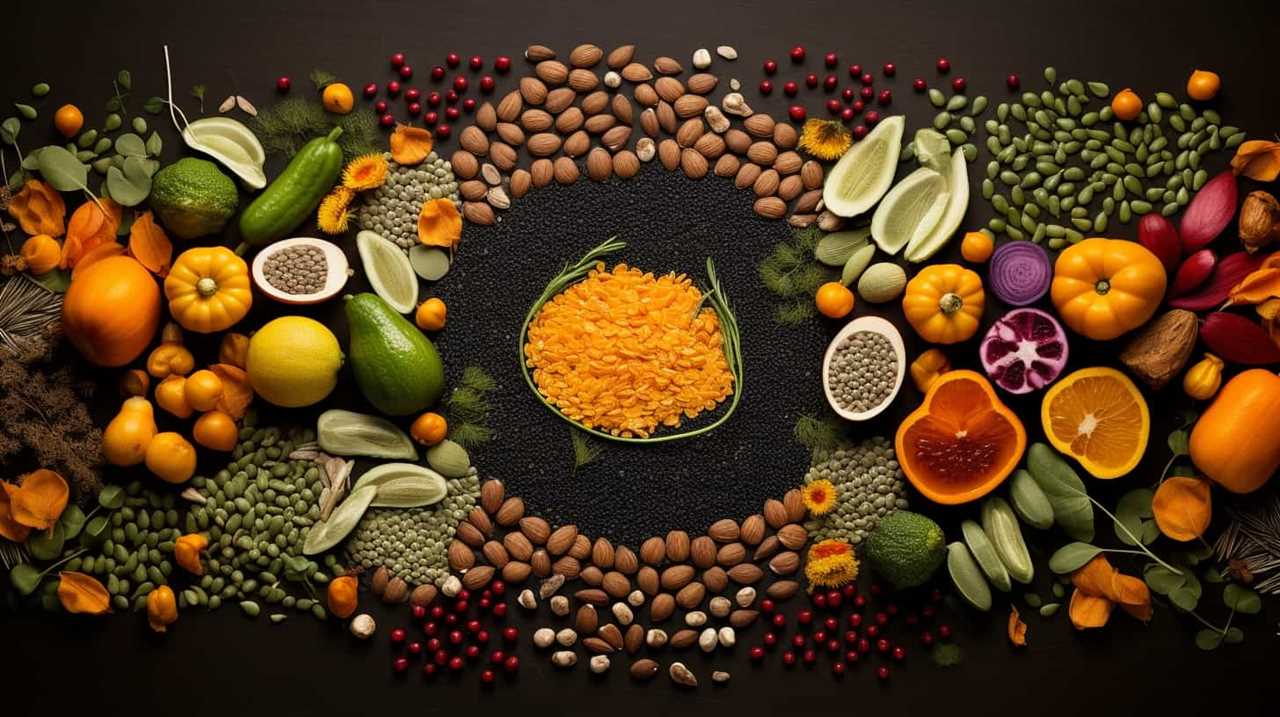
To prevent these digestive issues, it’s important to start with small amounts of chia seeds and gradually increase intake to allow the body to adjust. It’s also crucial to ensure that chia seeds are purchased from reputable sources to minimize contamination risks.
Allergic Reactions
When it comes to chia seed allergies, there are a few common ones that people may experience. These allergies can manifest in symptoms such as hives, itching, and swelling.
If you suspect an allergic reaction to chia seeds, it’s important to seek medical attention for proper diagnosis and treatment options.
Common Chia Seed Allergies
The prevalence of chia seed allergies poses a significant concern for individuals seeking to incorporate this superfood into their diet. While chia seeds are generally considered safe and offer numerous health benefits, some people may experience allergic reactions.

Here are some common chia seed allergies to be aware of:
-
Cross reactivity: Chia seeds belong to the mint family, which can lead to cross-reactivity in individuals who are allergic to other plants in this family, such as oregano, basil, or thyme.
-
Gluten sensitivity: Chia seeds are gluten-free; however, in rare cases, individuals with gluten sensitivity may experience adverse reactions when consuming chia seeds due to cross-contamination during processing or packaging.
-
Seed allergies: Some individuals may be allergic to seeds in general, including chia seeds. This can cause symptoms like itching, hives, or difficulty breathing.

-
Digestive issues: Chia seeds are high in fiber, which can cause digestive issues like bloating, gas, or diarrhea in some individuals.
If you suspect you have a chia seed allergy or experience any adverse reactions, it’s important to consult a healthcare professional for proper diagnosis and guidance.
Symptoms and Treatment Options
Continuing the discussion on common chia seed allergies, let’s now explore the symptoms and treatment options for allergic reactions.
Allergic reactions to chia seeds can manifest in various ways. Symptoms may include itching, hives, swelling of the lips, tongue, or throat, difficulty breathing, and abdominal pain. In severe cases, anaphylaxis can occur, which is a life-threatening allergic reaction that requires immediate medical attention.

If you experience any of these symptoms after consuming chia seeds, it’s important to seek medical help promptly.
Treatment options for allergic reactions to chia seeds involve avoiding further exposure to the allergen and managing the symptoms. Over-the-counter antihistamines can help alleviate itching and hives, while corticosteroids may be prescribed for more severe reactions. It’s also important to inform your healthcare provider of your chia seed allergy so that they can provide appropriate guidance.
While chia seeds are considered a popular superfood, individuals with chia seed allergies can explore alternative superfoods to ensure they meet their nutritional needs.
Now, let’s move on to the next section to understand the interactions between chia seeds and medications.
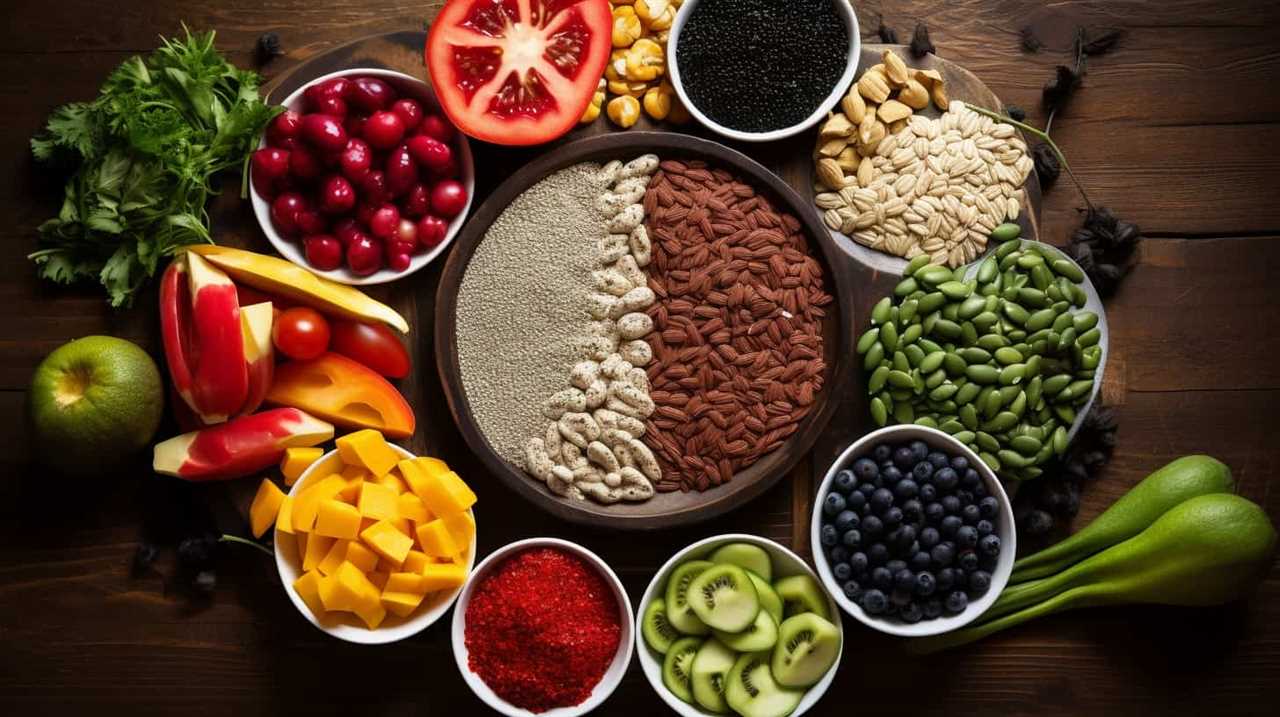
Interactions With Medications
We need to be aware of potential interactions between chia seeds and medications. While chia seeds are generally considered safe and have numerous health benefits, it’s important to note that they may interact with certain medications, leading to adverse effects. Here are some potential drug interactions to be mindful of:
-
Anticoagulant medications: Chia seeds are high in omega-3 fatty acids, which have blood-thinning properties. When taken together with anticoagulant medications like warfarin or aspirin, this can increase the risk of bleeding.
-
Blood pressure medications: Chia seeds may have a slight blood pressure-lowering effect. If you’re taking medications to control your blood pressure, consuming chia seeds in large amounts may cause your blood pressure to drop too low.
-
Diabetes medications: Chia seeds can help regulate blood sugar levels, so if you’re taking diabetes medications, it’s important to monitor your blood sugar closely to prevent hypoglycemia.
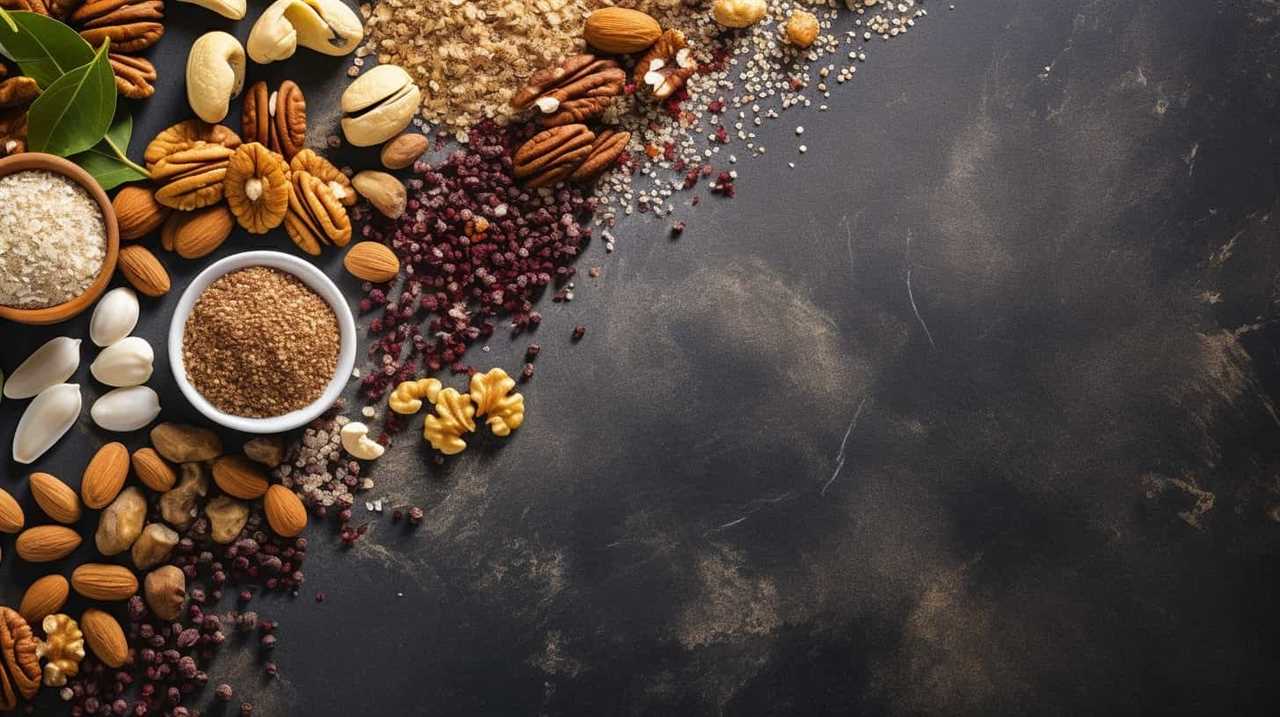
-
Thyroid medications: Chia seeds contain goitrogens, which can interfere with the absorption of thyroid medications. It’s best to separate the timing of chia seed consumption and thyroid medication intake.
Always consult your healthcare provider before making any changes to your medication regimen or incorporating chia seeds into your diet.
Choking Hazard for Some Individuals
When it comes to the consumption of chia seeds, it’s important to be aware of the potential choking hazard it poses for some individuals. To prevent choking incidents, it’s recommended to always consume chia seeds in a hydrated form, such as by soaking them in water or adding them to liquid-based foods.
Additionally, it’s crucial to identify high-risk individuals, such as those with swallowing difficulties or young children, who may be more susceptible to choking and take extra precautions when consuming chia seeds.
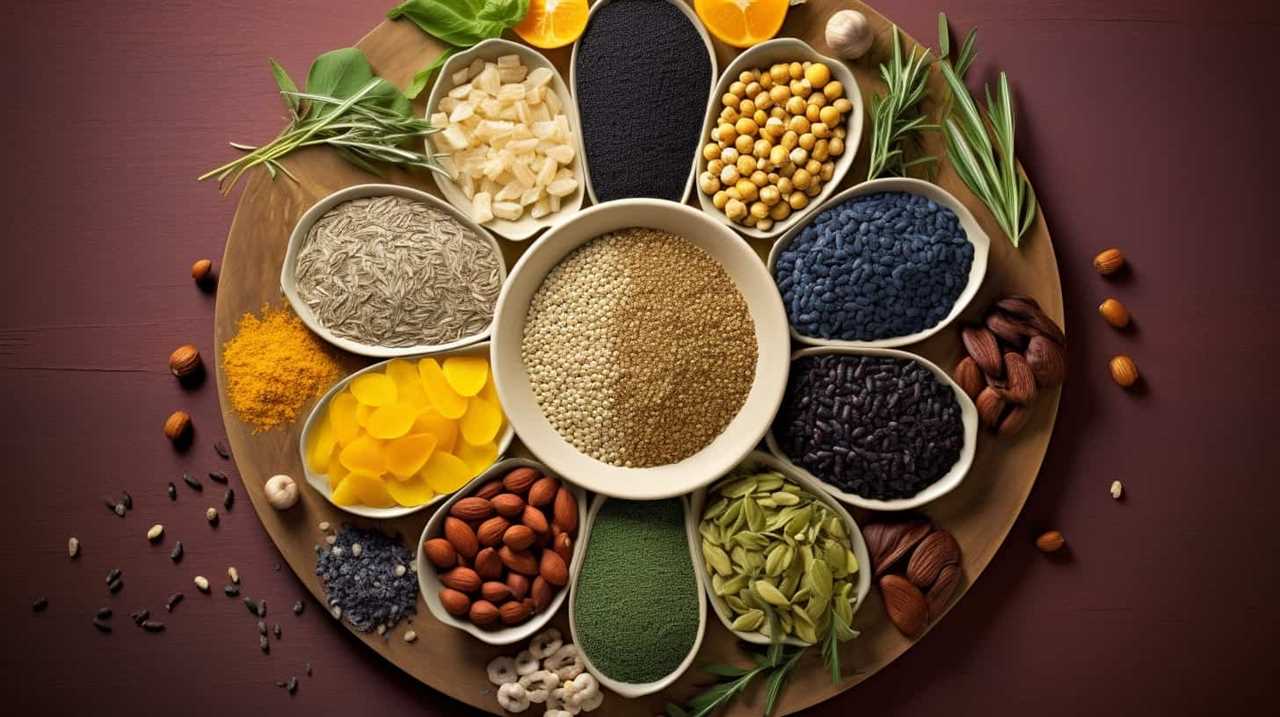
Prevention Measures for Choking
To address the choking hazard for some individuals, it’s important to implement proper prevention measures. Choking incidents can be life-threatening, so taking steps to prevent them is crucial.
Here are some preventive measures to consider:
-
Cut food into small, manageable pieces: This reduces the risk of choking, especially for those with swallowing difficulties.
-
Supervise meal times: Keeping an eye on individuals while they eat can help identify any potential choking hazards and provide immediate assistance if needed.

-
Encourage slow and mindful eating: Promoting slow and deliberate eating can help individuals chew and swallow their food properly, reducing the risk of choking.
-
Learn basic emergency response techniques: Being trained in basic first aid and the Heimlich maneuver can be invaluable in the event of a choking incident.
Identifying High-Risk Individuals
To properly address the choking hazard for some individuals and ensure their safety, it is important to identify high-risk individuals who may be more prone to choking incidents. Identifying risk factors can help us take preventive measures and minimize the risk of choking. Here is a table highlighting some common risk factors for choking incidents:
| Risk Factors | Description | Preventive Measures |
|---|---|---|
| Age | Infants, toddlers, and elderly | Cut food into small pieces, supervise mealtime |
| Swallowing Difficulties | Dysphagia | Modify food consistency, consult a healthcare professional |
| Neurological Disorders | Parkinson’s disease, stroke | Adapt eating techniques, follow healthcare professional’s guidance |
| Dental Problems | Missing teeth, denture problems | Chew food thoroughly, seek dental treatment if needed |
Contamination Risks
We need to be aware of the contamination risks associated with chia seeds. While chia seeds are generally considered safe for consumption, there are a few potential contamination risks to be mindful of:

-
Microbial contamination: Chia seeds can be contaminated with bacteria, such as Salmonella or E. coli, if they aren’t properly handled or stored.
-
Pesticide residues: Chia seeds may contain traces of pesticides if they aren’t grown organically or if they aren’t properly washed before packaging.
-
Heavy metal contamination: Chia seeds can sometimes contain heavy metals, such as lead or cadmium, which can be harmful if consumed in large amounts.
-
Allergen cross-contamination: Chia seeds may come into contact with other allergens, such as peanuts or tree nuts, during processing or packaging, posing a risk to individuals with allergies.

It is important to be aware of these contamination risks and ensure that you’re purchasing chia seeds from reputable sources.
Now, let’s move on to discussing the potential blood-thinning effects of chia seeds.
Blood-thinning Effects
Continuing the discussion on chia seeds’ potential health risks, let’s explore their blood-thinning effects.
Chia seeds contain omega-3 fatty acids, which have been shown to have blood-thinning properties. While this can be beneficial for some individuals, it can also pose risks, especially for those who are already taking blood-thinning medications.
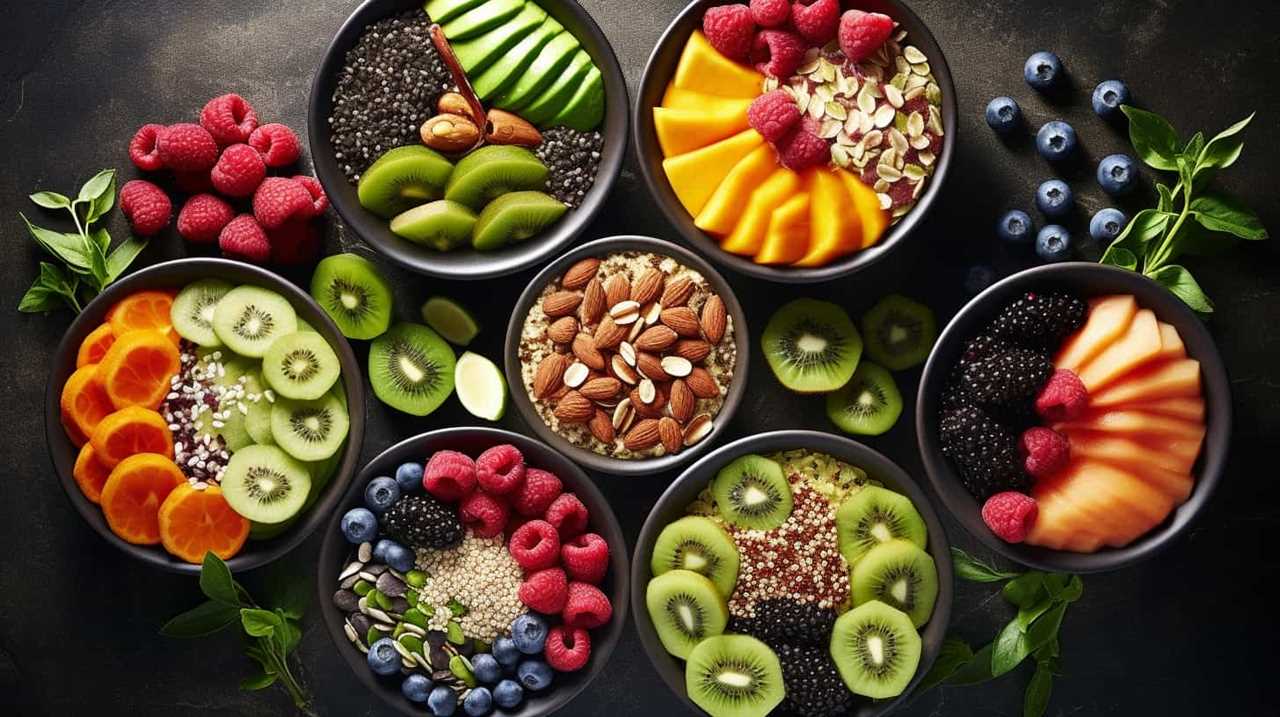
Chia seeds may interact with these medications, potentially increasing the risk of bleeding or bruising. It’s essential for individuals on blood thinners to consult with their healthcare provider before incorporating chia seeds into their diet.
Additionally, individuals scheduled for surgery should inform their healthcare team about their chia seed consumption, as it may need to be temporarily discontinued to prevent excessive bleeding during the procedure.
Being aware of these blood-thinning risks and potential medication interactions can help individuals make informed decisions about including chia seeds in their diet.
High Oxalate Content
The high oxalate content in chia seeds poses potential health risks for individuals. Oxalates are naturally occurring compounds found in many foods, including chia seeds. While oxalates aren’t harmful in small amounts, consuming high levels of oxalates can lead to health issues. Here are some important points to consider:
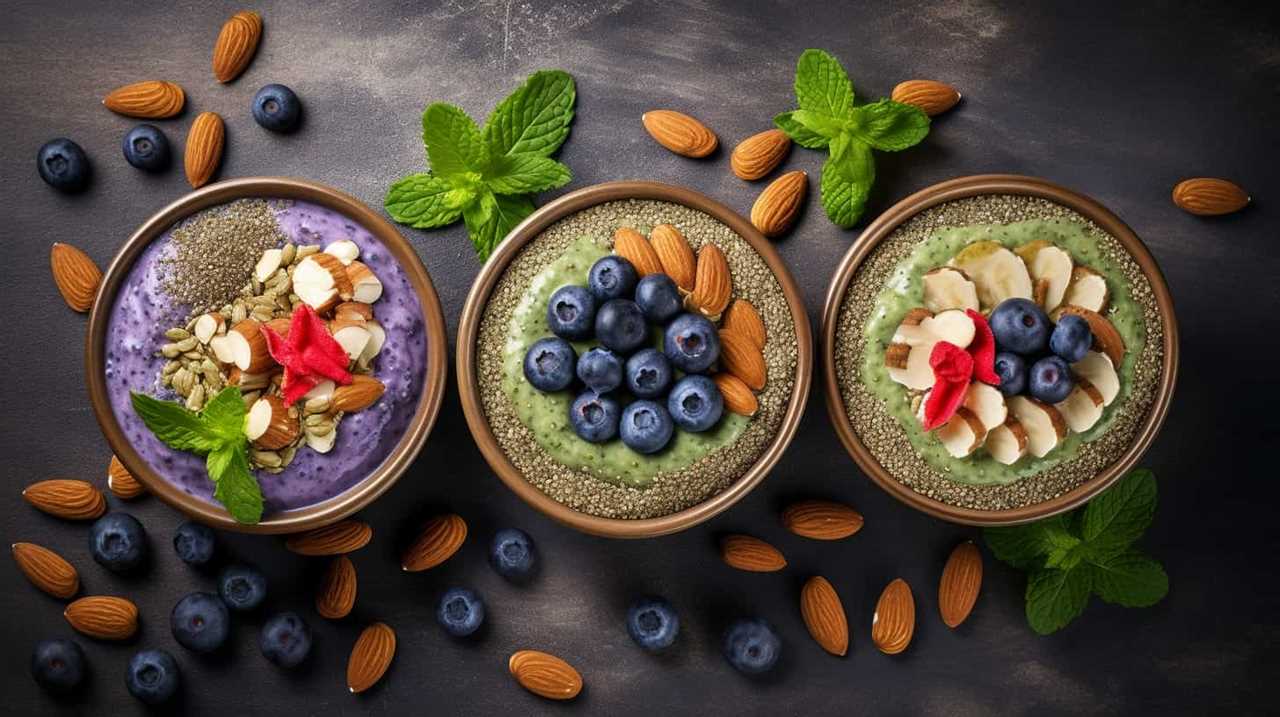
- High oxalate intake can increase the risk of kidney stones.
- Individuals with a history of kidney stones or kidney problems should limit their consumption of chia seeds.
- Drinking plenty of water can help dilute oxalates in the body and reduce the risk of kidney stone formation.
- Cooking or soaking chia seeds in water can help reduce their oxalate content.
It’s also essential to take preventive measures for choking when consuming chia seeds. Since chia seeds absorb liquid and expand, it’s crucial to mix them well with liquid before consuming to avoid the risk of choking.
Frequently Asked Questions
Can Chia Seeds Cause Stomach Bloating or Gas?
Chia seeds can cause stomach bloating or gas. We may experience digestive issues or gastrointestinal discomfort after consuming chia seeds. It’s important to listen to our bodies and adjust our intake accordingly.
Are Chia Seeds Safe for Individuals With Nut Allergies?
Chia seeds are a great alternative for individuals with nut allergies. However, it’s important to note that cross contamination can occur. To ensure safety, always check for chia seed alternatives that are labeled nut-free.
Can Chia Seeds Interact With Common Blood Pressure Medications?
Chia seeds may interact with common blood pressure medications, potentially causing side effects. It is important to consult with a healthcare professional to determine if chia seeds are safe to consume alongside your medication regimen.
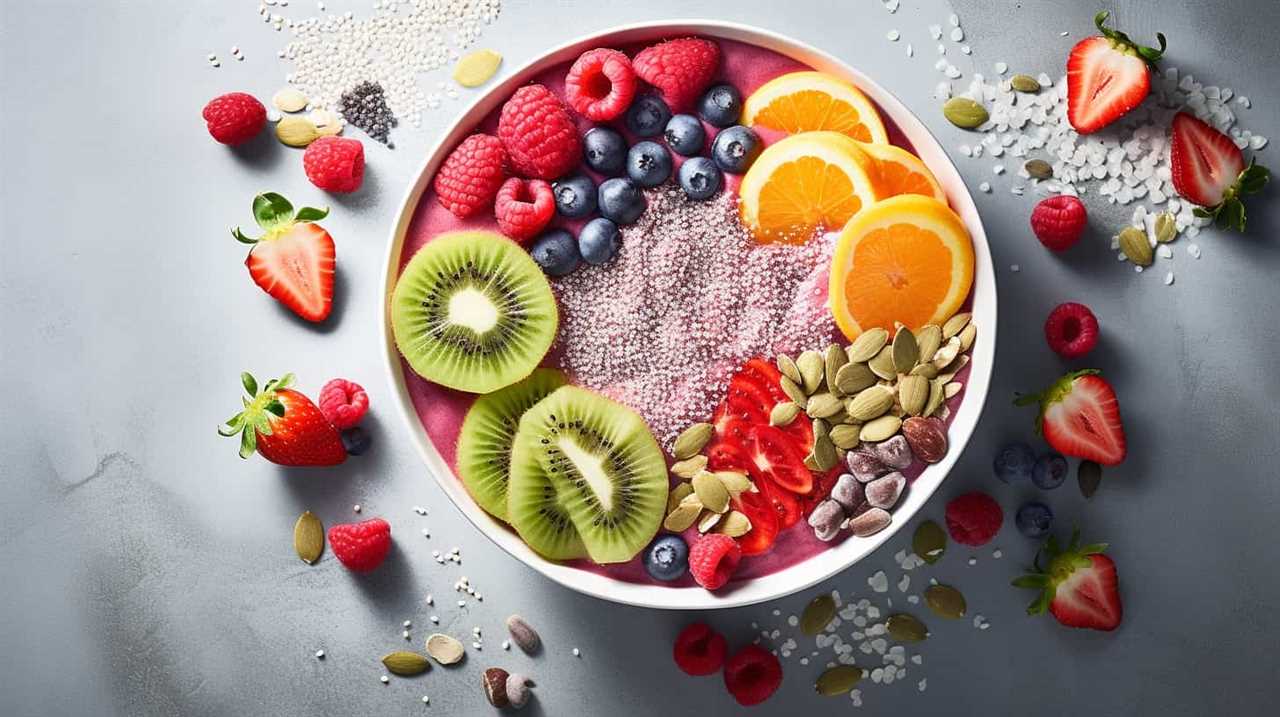
Do Chia Seeds Pose a Choking Hazard for Children?
Chia seeds can pose a choking hazard for children, so it’s important to be cautious. Additionally, some children may have allergies to chia seeds, which can cause adverse reactions.
Are There Any Contamination Risks Associated With Consuming Chia Seeds?
Yes, there are contamination risks associated with consuming chia seeds. These risks can include bacterial contamination, such as salmonella, which can lead to health concerns. It is important to properly handle and store chia seeds to minimize these risks.
Conclusion
In conclusion, while chia seeds have numerous health benefits, it’s important to be aware of potential risks and allergies. It’s advised to consume them in moderation and be mindful of any digestive issues or allergic reactions.
Additionally, one should consult with a healthcare professional if taking any medications that may interact with chia seeds. By being cautious and informed, you can enjoy the many benefits of chia seeds while minimizing any potential risks.










